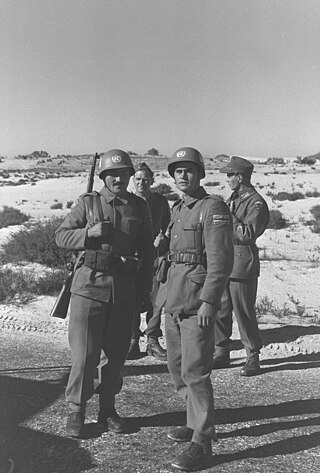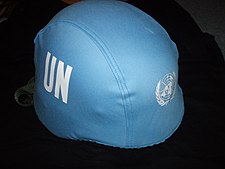Commemoration
The day is marked at the United Nations Headquarters in New York City with the presentation of the Dag Hammarskjöld Medal, statements by the President of the General Assembly and the Secretary-General, as well as a press release regarding the state of UN Peacekeeping missions and the continued necessity of their work.
There are also observances around the world; often countries will honor their own peacekeepers abroad, but the UN also organizes festivals, discussion forums, and memorials in cooperation with local and national groups.
In 2009, the UN put a special focus on the role of and need for women in peacekeeping, both as role models and also to serve in a number of gender-specific capacities. [2]
National Peacekeepers' Day is commemorated in Canada on 9 August in memory of the loss of life when a Canadian peacekeepers white UN marked passenger airplane was shot down by Syria. [3]

The United Nations (UN) is an international organization whose stated purposes are to maintain international peace and security, develop friendly relations among nations, achieve international cooperation, and serve as a centre for harmonizing the actions of nations. It is the world's largest international organization. The UN is headquartered in New York City, and the UN has other offices in Geneva, Nairobi, Vienna, and The Hague, where the International Court of Justice is headquartered at the Peace Palace.

The United Nations Truce Supervision Organization (UNTSO) is an organization founded on 29 May 1948 for peacekeeping in the Middle East. Established amidst the 1948 Arab–Israeli War, its primary task was initially to provide the military command structure to the peacekeeping forces in the Middle East to enable the peacekeepers to observe and maintain the ceasefire, and in assisting the parties to the Armistice Agreements in the supervision of the application and observance of the terms of those Agreements. The organization's structure and role has evolved over time as a result of the various conflicts in the region and at times UNTSO personnel have been used to rapidly deploy to other areas of the Middle East in support of other United Nations operations. The command structure of the UNTSO was maintained to cover the later peacekeeping organisations of the United Nations Disengagement Observer Force (UNDOF) and the United Nations Interim Force in Lebanon (UNIFIL) to which UNTSO continues to provide military observers.

Peacekeeping comprises activities, especially military ones, intended to create conditions that favor lasting peace. Research generally finds that peacekeeping reduces civilian and battlefield deaths, as well as reduces the risk of renewed warfare.

The United Nations Organization Stabilization Mission in the Democratic Republic of the Congo or MONUSCO, an acronym based on its French name Mission de l'Organisation des Nations Unies pour la stabilisation en République démocratique du Congo, is a United Nations peacekeeping force in the Democratic Republic of the Congo (DRC) which was established by the United Nations Security Council in resolutions 1279 (1999) and 1291 (2000) to monitor the peace process of the Second Congo War, though much of its focus subsequently turned to the Ituri conflict, the Kivu conflict and the Dongo conflict. The mission was known as the United Nations Mission in the Democratic Republic of Congo or MONUC, an acronym of its French name Mission de l'Organisation des Nations Unies en République démocratique du Congo, until 2010.
Canada was a founding member of the United Nations, and was an original signatory of the Declaration by United Nations. At the signing of the Declaration by United Nations, Canada was one of four Dominions of the British Empire present, alongside Australia, New Zealand, and the Union of South Africa. In 1945, Canada was present at the United Nations Conference on International Organization and signed the Charter of the United Nations. McGill University professor John Peters Humphrey was the principal author of the first draft of the Universal Declaration of Human Rights.

The United Nations Emergency Force (UNEF) was a military and peacekeeping operation established by the United Nations General Assembly to secure an end to the Suez Crisis of 1956 through the establishment of international peacekeepers on the border between Egypt and Israel. Approved by resolution 1001 (ES-I) of 7 November 1956, UNEF was developed in large measure as a result of efforts by UN Secretary-General Dag Hammarskjöld and a proposal from Canadian Minister of External Affairs Lester B. Pearson, who would later win the Nobel Peace Prize for it. The General Assembly had approved a plan submitted by the Secretary-General which envisaged the deployment of UNEF on both sides of the armistice line; Egypt accepted receiving the UN forces, but Israel refused it. In May 1967, Egypt asked that UNEF leave Egypt; as the troops started to evacuate over the next days, Israel invaded Egypt on 6 June 1967, initiating the Six-Day War and causing the death of one Brazilian Sergeant and 14 Indian peacekeepers – 17 other members of UNEF were also injured. The last member of UNEF left Egypt on 17 June.

The United Nations Mission in Ethiopia and Eritrea (UNMEE) was established by the United Nations Security Council in July 2000 to monitor a ceasefire in the border war that began in 1998 between Ethiopia and Eritrea. First military troops Netherlands - Canadian battalion 'NECBAT' arrived and established bases in the region in December 2000.

The United Nations Disengagement Observer Force (UNDOF) is a United Nations peacekeeping mission tasked with maintaining the ceasefire between Israel and Syria in the aftermath of the 1973 Yom Kippur War. The mission was established by United Nations Security Council Resolution 350 on 31 May 1974, to implement Resolution 338 (1973) which called for an immediate ceasefire and implementation of United Nations Security Council Resolution 242.
Australia was one of the founding members of the United Nations (UN) in 1945 and has been actively engaged in the organisation since its formation. The UN is seen by the Australian Government as a means to influence events which directly affect Australia's interests but over which they have little unilateral control.

Pakistan has served in 46 United Nations peacekeeping missions in 29 countries around the world. As of 2023, United Nations (UN) statistics show that 168 Pakistani UN peacekeepers have been killed since 1948. The biggest Pakistani loss occurred on 5 June 1993 in Mogadishu. Pakistan joined the United Nations on 30 September 1947, despite opposition from Afghanistan because of the Durand Line issue. The Pakistan Armed Forces are the sixth largest contributor of troops towards UN peacekeeping efforts, behind Ethiopia and Rwanda.
The United Nations Peacekeeping efforts began in 1948. Its first activity was in the Middle East to observe and maintain the ceasefire during the 1948 Arab–Israeli War. Since then, United Nations peacekeepers have taken part in a total of 72 missions around the globe, 12 of which continue today. The peacekeeping force as a whole received the Nobel Peace Prize in 1988.

The African Union-United Nations Hybrid Operation in Darfur was a joint African Union (AU) and United Nations (UN) peacekeeping mission formally approved by United Nations Security Council Resolution 1769 on 31 July 2007, to bring stability to the war-torn Darfur region of Sudan while peace talks on a final settlement continue.
Peacekeeping by the United Nations is a role of the UN's Department of Peace Operations as an "instrument developed by the organization as a way to help countries torn by conflict to create the conditions for lasting peace". It is distinguished from peacebuilding, peacemaking, and peace enforcement although the United Nations does acknowledge that all activities are "mutually reinforcing" and that overlap between them is frequent in practice.
The Dag Hammarskjöld Medal is a posthumous award given by the United Nations (UN) to military personnel, police, or civilians who lose their lives while serving in a United Nations peacekeeping operation. The medal is named after Dag Hammarskjöld, the second Secretary-General of the United Nations, who died in a plane crash in what is now Zambia in September 1961.
Pakistan officially joined the United Nations (UN) on 30 September 1947 just over a month after it came into existence. Today, it is a charter member and participates in all of the UN's specialised agencies and organisations. Pakistan has been elected seven times into the UN Security Council, with the most recent term in 2013. It is also one of the countries which has had a diplomat, Muhammad Zafarullah Khan, serve a term as the President of the United Nations General Assembly.

United Nations Security Council Resolution 1983 was adopted unanimously on June 7, 2011, after recalling meetings on HIV/AIDS in Africa and in the mandates of peacekeeping operations, as well as resolutions 1308 (2000), 1325 (2000), 1820 (2008), 1888 (2009), 1889 (2009), 1894 (2009) and 1960 (2010). The Council encouraged the inclusion of HIV/AIDS prevention, treatment, care and support in its peacekeeping mandates.

So far India has taken part in 49 Peacekeeping missions with a total contribution exceeding 200,000 troops and a significant number of police personnel having been deployed and more than 160 Indian peacekeepers have died serving under the UN flag as of September 2022. In 2014 India is the third largest troop contributor country [TCC] with 7,860 personnel deployed with ten UN Peacekeeping Missions of which 995 are police personnel, including the first Female Formed Police Unit under the UN. Recently Indian Peacekeepers were lauded by the UN for their efforts in preventing a carnage in the South Sudan conflict which resulted in the death of two of its soldiers.

Canada's role in the development of, and participation in, peacekeeping during the 20th century led to its reputation as a positive middle power. Canada's strong support for multilateralism has been closely related to its peacekeeping efforts. The Canadian public considered the country's peacekeeping role as one of the country's top international identifiable contributions.
Malaysia became the 82nd member of the United Nations on 17 September 1957. Malaysia has held a rotational non-permanent seat on the United Nations Security Council for four terms, and has participated in over 30 United Nations peacekeeping missions since October 1960.
The Peacekeeping Unit is a battalion of the Islamic Republic of Iran Army Ground Force tasked with peacekeeping missions overseas and assigning personnel contributed by Iran to the United Nations peacekeeping.










